Golf Tricks For Newbie Golfers
Putting: Keep your shoulders on line
One of the most crucial fundamentals of consistent putting is making sure your shoulders start and stay on-line during the stroke. Here’s a drill that will help you see if your shoulder alignment remains consistent: Set up in your normal putting stance, then place the putter across your shoulders, parallel to your intended target line. Your right arm should remain in its normal address position. As a further alignment check, set your right hand perpendicular to your line–just as you’d square the putterface to the target.
Practice your stroke with the right hand only while holding the shaft along the shoulders. The shaft should stay parallel to your target line as your shoulders rock up and down to move your right arm through the stroke.
The in-to-in swing
Here’s an easy practice drill for longer, straighter tee shots: Place one tee off the heel of your driver at address and another off the toe–just beyond the teed-up ball–that’s the “gate” your clubhead swings through. Next, place a third tee about six inches inside your target line, about a foot behind the ball; a fourth tee goes a foot closer to the target than the ball and about six inches inside the target line. That’s your path coming into and extending beyond the impact gate. Trace the tees with your clubhead, and you’ll groove the proper in-to-in swing path.
How to stop swaying on short shots
Excessive lateral movement with the lower body on short shots can cause the arc of the swing to bottom out before the ball, leading to fat or bladed shots.
Often, amateurs try to correct this problem by widening their stance. Though this change may give you a feeling of being in better balance, it won’t necessarily keep you from swaying.
Instead, try narrowing your stance to no wider than your hips. A narrow stance will make it easier to feel the lower body rotate through the shot, as opposed to swaying from side to side. A stance that’s more narrow will also give you a more defined center of gravity. This improves your balance and stability, plus it moves the bottom of your swing arc forward, resulting in a more descending angle for crisp, solid contact.





